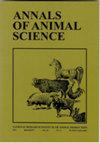Effects of dietary supplementation of peppermint extract on growth performance, intestinal microbiota, liver and intestine histopathology of Cyprinus carpio
IF 2.2
4区 农林科学
Q2 AGRICULTURE, DAIRY & ANIMAL SCIENCE
引用次数: 0
Abstract
Abstract This study aimed to evaluate the effects of Mentha piperita methanolic extract (MPE) on Cyprinus carpio intestinal microbiota, including total microorganisms gram-negative bacteria, lactic acid bacteria, and fungi count. Liver and intestinal histopathology, and the activity of liver enzymes, were also used to evaluate the possible side effects of MPE. A total of 96 healthy C. carpio fries (76.76±20.26 g) were allocated to four treatment groups with three replications in a completely randomized design. The fries were fed with diets containing 0, 0.5, 1, and 2% extract for 56 days at the rate of 2% of body weight during the experiment. Results showed a significant decrease in total microorganisms, enteric gram-negative bacteria, and total fungi counts (P<0.05). The total lactic acid bacteria count in 0.5% treatment was significantly lower than in control and 2% treated fish (P<0.05). MPE did not affect AST, leading to a significant increase in ALT levels. Simultaneously, ALP represented significantly higher activity in the control group (P>0.05). Microscopic findings revealed marked lesions, including congestion and cell degeneration in the livers of the three groups of fish fed with the extract. The intestinal folds were shortened and blunted in the treatment groups. Furthermore, the intestinal mucosa was necrotic, and the lamina propria was significantly thickened with mononuclear inflammatory cells (P<0.05). Although MPE significantly affects intestinal microbiota, its consumption at 2% is not recommended for C. carpio due to the lesions made in the liver and intestine.饲粮中添加薄荷提取物对鲤生长性能、肠道菌群、肝脏和肠道组织病理学的影响
摘要本研究旨在研究薄荷醇提物(MPE)对鲤肠道菌群的影响,包括革兰氏阴性菌总数、乳酸菌总数和真菌数量。肝脏和肠道组织病理学以及肝酶活性也被用来评估MPE可能的副作用。采用完全随机设计,将96只健康鲫鱼(76.76±20.26 g)分为4个处理组,每组3个重复。试验期间,按体重的2%饲喂含0、0.5、1、2%提取物的饲料,连续饲喂56 d。结果显示,肠道微生物总数、革兰氏阴性菌总数和真菌总数显著降低(P0.05)。显微镜检查结果显示,三组喂食提取物的鱼的肝脏有明显的病变,包括充血和细胞变性。治疗组肠道褶皱缩短、变钝。肠黏膜坏死,固有层单核炎性细胞明显增厚(P<0.05)。尽管MPE对肠道微生物群有显著影响,但由于肝脏和肠道的病变,不建议将其摄入量控制在2%。
本文章由计算机程序翻译,如有差异,请以英文原文为准。
求助全文
约1分钟内获得全文
求助全文
来源期刊

Annals of Animal Science
农林科学-奶制品与动物科学
CiteScore
4.00
自引率
5.30%
发文量
138
审稿时长
6-12 weeks
期刊介绍:
Annals of Animal Science accepts original papers and reviews from the different topics of animal science: genetic and farm animal breeding, the biology, physiology and reproduction of animals, animal nutrition and feedstuffs, environment, hygiene and animal production technology, quality of animal origin products, economics and the organization of animal production.
 求助内容:
求助内容: 应助结果提醒方式:
应助结果提醒方式:


